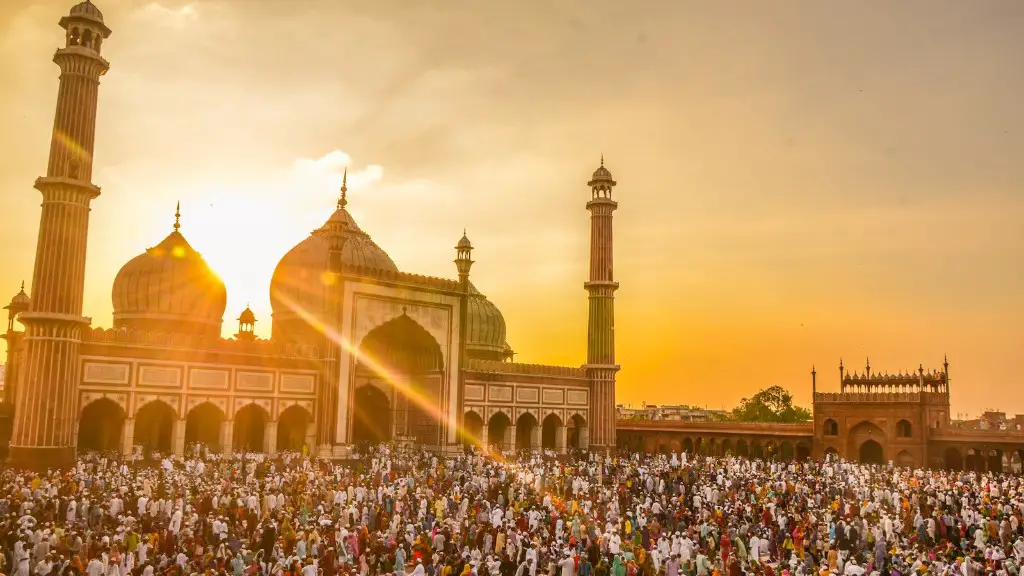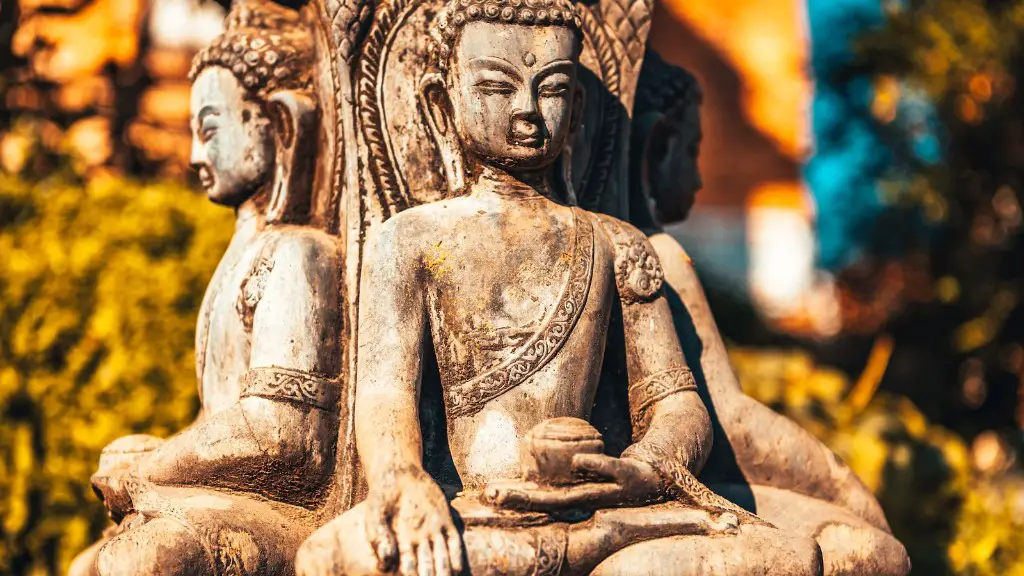Many understand the concept of God in Hinduism differently. While some believe that God is a single supreme being that is the creator of the universe, others believe that God resides in everything in the universe and is part of it. In Hinduism, some believe that “God” is actually the universe, and this is a very popular belief in the Indian subcontinent.
The concept of God as the Universe in Hinduism can be traced back to the ancient Vedic Upanishads, in which it is stated that the entire universe is a manifestation of Brahman, the highest and purest form of God. This is considered to be the authorless and formless source of all knowledge, energy and matter. In essence, Brahman is the source of all that exists and is, therefore, the Universe itself.
To understand how this is possible, it is essential to understand the concept of the Trimurti, which is composed of Brahma, Vishnu and Shiva. Brahma is the creator, Vishnu is the preserver, and Shiva is the destroyer, thus forming the Holy Trinity of Hinduism. Each one of these deities is seen as a part of the same divine energy, and together, they form the Universe. So, in essence, when we talk about God as the Universe in Hinduism, we are talking about these three deities as representing the Universe as a whole.
Those who believe in the concept of God as the Universe in Hinduism also believe that all living beings, including humans, are part of this same energy or Brahman. Therefore, they are part of the same Universe and are connected in some way to all that exists. This is why Hinduism is so focused on self-realization; it helps people recognize and realize their connection to the divine and to the Universe.
Another great resource for understanding the concept of the Universe in Hinduism is the Bhagavad Gita. This sacred text is seen as a guide to living life and outlines the concept of karma and the importance of performing one’s duties in life. It also focuses on living in balance with the Universe and understanding that all of life is interconnected. So, in essence, the Bhagavad Gita serves as a great guide to understanding how God is the Universe in Hinduism.
While the concept of God as the Universe in Hinduism might seem confusing at first, it actually makes a lot of sense and is a powerful way of living life. When people understand their connection to the Universe, they can start to see the positive effects that it has on the world around them and their own lives.
Religion and Rituals in Hinduism
Religions in Hinduism involve rituals and practices to honor the gods, goddesses, and cosmic divine energy or Brahman. The rituals are typically performed by priests in temples or by family members in the home. These rituals are meant to connect the people to the gods, goddesses and Brahman, the divine energy that permeates the Universe. It is thought that doing rituals such as puja, chanting mantras, invoking gods, and doing offerings can help one connect to the divine and the Universe.
Aside from rituals, religions in Hinduism also involve philosophical concepts and ideas. These ideas are often expressed in stories and are intended to act as metaphors for understanding and contemplating life. By understanding the complex stories and metaphors, one can come to a deeper understanding of life and the interconnectedness of the Universe.
Religions in Hinduism are also heavily focused on service to humanity. This is one of the principles in Hinduism and is especially embodied in the Bhagavad Gita. By serving others, one can come to a deeper understanding of their connection to the Universe, as well as the interconnectedness of all beings. It is thought that when one serves others, they can also come to a deeper understanding of themselves and how they fit into the larger picture.
Overall, Hinduism is a complex and diverse religion that is full of rituals, philosophies, and stories. By understanding and embracing these elements, one can come to a deeper understanding and appreciation for the concept of the Universe in Hinduism.
Modern Interpretations of Universe in Hinduism
In recent years, Hinduism has seen a resurgence as more people try to find meaning and spirituality in their lives. The concept of God as the Universe has been embraced by many as a way to reconnect with their divine nature and the Universe. This is evidenced by the growing popularity of new-age Hindus and alternative spiritual paths. These paths typically focus on living in balance with the Universe and attaining greater spiritual awareness.
One of the most popular modern interpretations of the Universe in Hinduism is through the teachings of Sadhguru. Sadhguru is a spiritual master and mystic who teaches yoga and meditation as a way to connect with the divine and the Universe. His teachings focus on living in harmony with the Universe and living a life of joy and light. By understanding Sadhguru’s teachings, one can connect to the divine and come to an understanding of how they are part of the Universe as a whole.
Another modern interpretation of the Universe in Hinduism is through ayurveda. Ayurveda is a holistic healing system that has its roots in Hinduism. It is based on the idea that all the elements in the Universe are connected and need to be in balance for one to be healthy and happy. By understanding the principles of ayurveda and incorporating them into one’s life, one can come to a deeper understanding of how they are part of the Universe.
Finally, Transcendental Meditation is another popular form of modern yoga that is rooted in Hinduism. It is a way to reach spiritual enlightenment and come to an understanding of one’s relationship to the Universe. By practicing Transcendental Meditation, one can come to an understanding of how they are connected to the divine energy that is part of the Universe.
Conclusion
In conclusion, Hinduism is a complex and ancient religion that is full of rituals, philosophies, and stories. At its core, Hinduism believes that God is the Universe and that all living beings and things are part of this same divine energy or Brahman. This concept is seen in the Vedas and Upanishads, as well as in the Bhagavad Gita and other sacred texts. In modern times, the concept of God as the Universe in Hinduism has been embraced by many people and can be seen in various forms of spirituality and healing, such as ayurveda and meditation.
Self-Realization and Universe in Hinduism
One of the most important concepts in Hinduism is that of self-realization. This is the idea that the Universe is interconnected and that all living beings, including humans, are part of this same divine energy or Brahman. It is thought that by recognizing and realizing this connection, one can come to a deeper understanding of life and the beauty of the Universe.
In Hinduism, self-realization is seen as a way to connect to the divine and to the Universe as a whole. This is done through various rituals and practices, such as puja and chanting mantras. Doing these rituals can help one connect to Brahman, the divine energy that permeates the Universe. It is also thought that these rituals can help one come to an understanding of how they are connected to the Universe and their place in it.
Aside from rituals, Hinduism also emphasizes the importance of meditation and yoga as a way to connect with the divine and to the Universe. This type of spiritual practice is seen as a tool to help one understand their connection to the Universe and to help them come to a deeper understanding of life and its meaning. By doing this, they can come to an understanding of how they fit into the larger picture of the Universe.
Finally, Hinduism also teaches that living a life of service to others is a way to connect with the Universe. This is seen in the Bhagavad Gita as one of the principles for living life and connecting with the divine. By understanding that all living beings are interconnected and by living a life of service, one can come to a deeper understanding of the Universe and their place in it.
Metaphors in Hinduism’s Universe concept
In Hinduism, the concept of God as the Universe can also be seen in metaphors and stories. For instance, the ancient Vedic texts often use the metaphor of a tree to explain the concept of the Universe. In this metaphor, the branches of the tree represent different aspects of the Universe, while the roots represent the source of all things, which is Brahman.
This metaphor is used to demonstrate how all things in the Universe are connected and how they are part of the same divine energy or Brahman. This same metaphor can also be seen in modern interpretations of Hinduism, such as Transcendental Meditation, which uses the metaphor of the tree of life to explain the interconnectedness of all things.
Another popular metaphor in Hinduism is that of the spokes of a wheel. This metaphor is used to show how the Universe is composed of different aspects, all of which are interconnected and contribute to the larger whole. This metaphor is often used to explain how one’s actions can have an effect on the Universe and how one’s choices can have an impact on the larger picture.
Finally, the concept of the Universe in Hinduism can also be seen in the metaphor of a mandala. A mandala is essentially a circular structure that is composed of different parts, all of which contribute to the larger whole. This metaphor is used to demonstrate how the Universe is composed of different aspects, all of which are interconnected and are part of the same divine energy or Brahman.
Overall, there are many metaphors and stories in Hinduism that are used to explain the concept of God as the Universe. By understanding these metaphors and stories, one can come to a deeper understanding of how they are connected to the Universe and their place in it.



